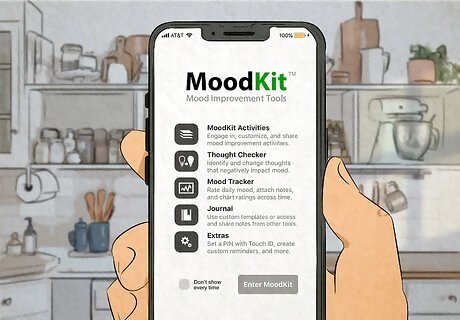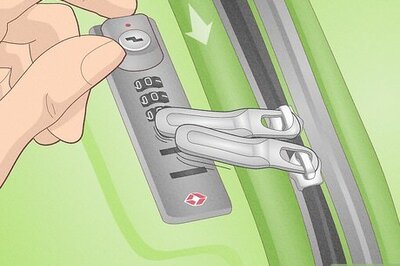
views
- Start small by choosing 1-2 goals that require self-control instead of trying to change everything overnight.
- Maintain a positive attitude and combat black-and-white thinking whenever you start judging yourself for giving in to an urge.
- In the long run, regular exercise and plenty of sleep can make it a lot easier to control yourself and change your habits.
Motivate yourself.

Be your own hype person and stay upbeat about changing. Maintain clear reasons for why you want to control your behavior and remind yourself that you can do it. Try to find your inner motivation and journal about it. You could also keep a list of the benefits of changing on a small piece of paper and keep it in your wallet. For example, say you’re trying to develop self-control to stop smoking. You could write down the cost of buying cigarettes, the effects on your health, the smell, caring for your teeth, etc. You might make a list of all the positives of quitting smoking, including having more money to spend on other things, whiter teeth, breathing easier, or whatever reasons you can think of that will motivate you to quit.
Choose small, concrete, and realistic goals.

Trying to change everything overnight will be overwhelming. The most likely way you’ll fail while trying to cultivate self-control is getting frustrated with yourself for not changing immediately. Quitting anything cold turkey will just be too daunting. Set yourself up for success in your efforts by setting realistic goals that help you slowly taper away from whatever behavior you want to change. Be realistic about what kind of changes you can make that will fit into your life, your time, and your ability. If you try to change everything at once, as ambitious as this may be, you can risk self-sabotaging your efforts and giving up. For example, if you're building self-control to avoid compulsive eating, switching to nothing but fruits and vegetables all at once is too ambitious. Instead, try to add some veggies to dinner every day. After a few weeks, switch your snacks to fresh fruits. There’s nothing wrong with going slow!
Stay positive.

Having a positive attitude can prevent things from getting overwhelming. Don’t be too hard on yourself if you feel like you are not reaching your goals. Keep your focus on continually making the effort, and let go of perceived failure. You can always try again! You can use your journal to reframe negative statements if you feel you gave in to impulsivity instead of reaching your goals. For example, if your goal is not to spend money impulsively but you went on a shopping spree, take another look at your goals and remind yourself you had a really bad day. Take some time to journal what you could do differently next time, such as going to yoga class. Congratulate yourself on your awareness and get ready to try again.
Cultivate self-awareness.

The more self-aware you are, the easier change will be. Developing awareness about your own headspace and emotional well-being will help you recognize the behavior. Nurturing awareness around your impulsive behaviors will help you feel more in control of yourself and can also help you make decisions about how you want to build self-control. It’s all about what feels right for you, and building self-control starts with awareness of why you sometimes feel impulsive. Think about binge eating. If you aren’t aware of how you feel when you want to binge, it’ll be a lot harder to change that behavior. Do you notice that you tend to binge eat when you are stressed? Maybe you binge eat to celebrate. Do you find yourself binge eating when you feel anxious or sad? Monitoring your underlying headspace will help you deal with the feelings instead of relying on the coping mechanism.
Remove temptations.

Identify your major triggers and consciously avoid them. Giving in to your urges is a lot harder when the object of your desire is right there. Most of us know what drives us off track, so locate what those triggers are for you and remove them from your environment or daily schedule. If you want to build your self-control when it comes to diet, don’t buy those extra “treats” and skip the soda when you’re grocery shopping. If you’re trying to improve your daily productivity and social media is a huge time sink, delete Facebook and Instagram from your phone. If you want to be more productive at home but you can’t stop watching Netflix, move the TV out of your office and block the website on your computer.
Use focused breathing to soothe urges.

In the moment, use belly breathing to fight intense urges. Let’s say you have a cigarette or food craving. Instead of immediately giving in, set your phone timer for 5 minutes and focus on breathing from your belly. Put one hand on your stomach and slowly inhale. Feel the air entering your chest and going down to your diaphragm. After a few minutes, the craving should dissipate. Controlling your breathing helps you get out of your head and focus on your body. This soothes strong urges and helps calm stress.
Exercise regularly to improve your headspace.

Working out is scientifically proven to improve self-control. There is a direct correlation between exercise and being able to control your impulses and urges. Even if it’s just a few days a week, running, lifting weights, or doing calisthenics at home will help make it easier to control yourself and make productive decisions—all while improving your health! Exercise is also a good way to develop self-control in the sense that it requires you to take action and do something you probably don’t want to automatically do on your own.
Get a good night’s sleep.

Impulse control is a lot easier if you’re well-rested and feel good. Get at least 8 hours of uninterrupted sleep each night. It might sound like this has nothing to do with self-control, but there’s a massive relationship between getting enough rest and being able to avoid impulsive behavior and urges. If you want to be focused and in control during the day, skip the all-nighters. Like forcing yourself to exercise, forcing yourself to maintain a consistent sleep schedule probably reinforces your sense of control. It’s a lot harder to avoid your impulses if you’re exhausted. For example, it’s a lot harder to cook a healthy meal and a lot easier to order fast food on DoorDash if you’re super tired. Maintaining good sleep hygiene also helps you avoid decision fatigue. By “sleeping on it” instead of forcing yourself to make a decision before bed, you’ll prevent yourself from getting mentally strained. In the morning, you'll be clear-headed, rested, and ready to decide.
Monitor your daily behavior.

Tracking how you spend your day will provide key feedback. It’s hard to maintain self-control if you aren’t paying attention to when you are or are not successful. Keep a small journal on you and track when you do or do not give into temptation during the day. Pay attention to how you feel at the end of each day and ask yourself, “Why do I feel this way?” These daily monitoring activities will help you identify problem areas and improve slowly over time. There are lots of great apps out there for this! MoodKit, Daylio, Habitify, and The Habit Tracker are all popular apps that make monitoring yourself a lot easier.
Forgive yourself for failing.

Let go of the hardcore intensity you’re putting on yourself. Human beings are not designed to be raw machines of focus and productivity. Time wasters, daydreaming, boredom, and relaxation are all important pieces of the self-control puzzle. The harder you are on yourself, the harder it will be to cultivate a productive and meaningful sense of self-control. Be easy on yourself. It’s a marathon, not a race. Treating the journey of cultivating self-control as a zero-sum game will only reinforce the black-and-white thinking that makes avoiding temptation so intense and serious. For example, if you’re trying to exercise more often and you fall asleep after work so you don’t get a daily run in, don’t get upset! Your body needed rest and you did nothing wrong.
Channel your urge into something productive.

Pick a go-to activity that’s more productive than your urge. Instead of sitting around trying to fight an urge, actively replace that behavior with something more meaningful. A substantive alternative to an urge will give you something to distract yourself with. This way, you can beat the urge and accomplish something productive instead! For instance, if you’re trying to stop spending money, you can go for a walk in a green space where you won’t even have the opportunity to shop. Or if you’re trying to control snapping at people, you can develop the habit of hitting the gym to blow off steam when you're stressed.
Combat impulsive thoughts.

Develop a strategy to fight unproductive thoughts. Having strategies to help you resist temptation in the moment will help you build self-control. Start by making a list of the behaviors you’d like to control and the situations that often trigger the behavior. By recognizing the moments when you get the urge to act impulsively, you’ll be more equipped to create a delay between the urge and action. Take a look inward at what matters most to you and what your values are. Balance is going to look different depending on what your goals are, so try to achieve it by avoiding impulsive thoughts.
Ask friends and family for support.

Use your support system to help you achieve your goals. Let your friends and loved ones know that you are trying to change your behaviors. Ask people in your life who are supportive if you can call or text them if you need support. Part of believing in yourself and creating change also means allowing others to help you. Although empowering yourself is a large part of building self-control, letting others in your life give you pep talks, motivate you, and listen when you need it will help immensely. For example, if you’re trying to quit smoking and you’re tapering down, ask your roommate to hold your cigarettes for you and only give them out at specific times. If you’re trying to get better about keeping a schedule, ask your parents or partner to remind you to fill out your planner every night.
Reward yourself for making progress.

Give yourself something rewarding as you hit big milestones. This is the ideal way to keep the momentum up as you’re making progress. Rewarding yourself for practicing self-control will help reinforce positive behaviors to replace impulsive behaviors. You could buy yourself something, take a day off of work, or celebrate with others. For example, if you are trying to get better about socializing every week, you could buy yourself a new fancy TV in exchange for hosting a weekly movie night with friends.
Seek help if you need extra support.

There’s no shame in soliciting professional help. While building self-control is a wonderful and ambitious way to change your life, there are times you need additional support. Seek professional help and support: If you are struggling with alcohol, drugs, or other substances. If you are engaging in dangerous or addictive behaviors (compulsive sex, kleptomania, etc.). If you find yourself repeatedly engaged in abusive or dangerous relationships. If you are struggling to control your anger and you may (or have) hurt yourself or others.




















Comments
0 comment